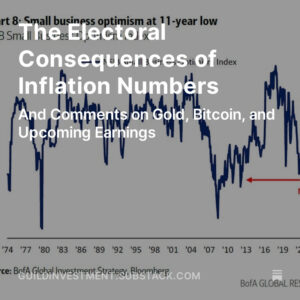Is E-Commerce an Employment Wrecking Ball? Nope: It Creates More, Better-Paying Jobs and Boosts Productivity
After strong stock-market performance in the year to date, several big U.S. tech firms have begun to receive some negative attention from the public, as well as from regulators and politicians. Alphabet [NASDAQ: GOOG] and Facebook [NASDAQ: FB] have gotten the most scrutiny, with European regulators leveling accusations of unfair search advantages against GOOG, and U.S. lawmakers drawing FB into the controversy surrounding alleged Russian efforts to influence the outcome of last year’s election.
Amazon [NASDAQ: AMZN] has not been above the fray. The company’s recent acquisition of Whole Foods Market led to a few muted pieces of press coverage that mentioned “antitrust,” but more significant was a sense that public opinion might be starting to turn. NYU business professor Scott Galloway, whose popular YouTube channel is generally worth watching for its good analysis and pithy insights, says: “These companies avoid taxes, invade privacy, and destroy jobs to increase profits because… they can… We think these companies are progressive, when their behavior is more like Darth Vader crossed with Ayn Rand.”
The accusation of job destruction is leveled squarely at AMZN. Galloway says of AMZN CEO Jeff Bezos: “What’s clear is that we need business leaders who envision, and enact, a future with more jobs — not billionaires who want the government to fund, with taxes they avoid, social programs for people to sit on their couches and watch Netflix all day.”
Professor Galloway is in many respects a barometer of public opinion; and his opinion is that the government will, in one way or another, be coming for big tech, and particularly for AMZN, which he predicts will become the world’s first trillion-dollar company and then be broken up by regulators.
That shift in psychology, from “tech as the harbinger of economic growth and consumer abundance” to “tech as the destroyer of jobs and the handmaiden of inequality,” may explain why the stocks of many of the big tech companies have been languishing since midsummer.
Automation Creates More Jobs Than It Destroys
Public anxieties about the economic and social effects of the tech giants are deep and varied. Late last year we wrote in this letter about automation — a constant theme of the tech-anxious, who believe that together with artificial intelligence, it will usher in a wave of job destruction so severe that governments will have to resort to providing their citizens a “basic minimum income,” or BMI. BMI has passed from the pages of radical journals into the mainstream of discourse in much of Silicon Valley, where there is often an uncritical cultural acceptance of the need for beneficent intervention by government to ameliorate the negative effects of technology.
The trouble is that automation, historically, doesn’t seem to be the boogeyman it is in popular consciousness. Research done by Boston University scholar James Bessen has shown convincingly that the more automated an industry becomes, the more job growth that industry experiences. This trend is observable from the earliest days of the industrial revolution to the present. In the 19th century, for example, 98% of the labor needed to make a yard of cloth was automated — and weaving jobs increased. Stated simply, automation meant falling prices, which meant so much more demand for and consumption of cloth that more employment was needed in spite of automation. (And it might be worth reminding readers that our present-day wardrobes would be an embarrassment of riches to a visitor from the days when cloth was made by hand.) The same pattern has played out in many industries. Interested readers can watch a good presentation on the subject here.
E-commerce and Retail
We recently read a similarly contrarian study of the effect of e-commerce on employment, published in September by the centrist think tank, the Progressive Policy Institute. (Interested readers can find it here.) The common narrative is that e-commerce, in killing brick and mortar retail, is destroying jobs, and that the few jobs it does create are lower-paid positions. The new study suggests that both aspects of the narrative are false.
The authors estimate that between 2007 and June, 2017, brick-and-mortar retail jobs declined by 140,000, while e-commerce jobs rose by 400,000 in the same period. Similarly, based on a county-by-county analysis in the U.S., they estimate that jobs in e-commerce fulfillment centers pay 30% more than brick-and-mortar retail jobs in the same area.
Their fundamental insight is this: before the rise of e-commerce, the picking, packing, and shipping of retail items was handled by consumers themselves. Currently, the authors estimate, Americans spend 1.2 billion hours per week shopping. Those are unpaid hours, outside the formal economy. They might enjoy “working” some of those hours for free, but the rise of e-commerce suggests that largely, they don’t enjoy it. (To put that in perspective, paid retail, wholesale transportation, and warehousing had 950 million hours per week of paid work in 2016.)
The authors write:
“In our view, e-commerce is primarily a machine for turning unpaid household hours shopping into paid market work… Some of those unpaid hours are now being shifted to fulfillment center workers, who do the ‘picking and packing’ for customers, and truck drivers, who do the driving.”
In other words, e-commerce is not cannibalizing jobs from the retail sector; it’s rearranging and expanding the retail sector, and creating jobs by converting unpaid into paid work. This is how it can be a net job creator rather than a net job destroyer.
Interestingly, other data corroborate this conclusion. For example, the average time spent shopping, and brick and mortar’s share of retail sales,have been declining in lockstep since 2004.
Analysts and commentators have missed the real effects of e-commerce because they based their work on flawed or careless interpretation of employment and wage data. The Bureau of Labor Statistics does not always categorize workers correctly, so the authors reached their conclusions by drilling down into county-level data, and triangulated it with other data available about the construction of e-commerce fulfillment centers.
In effect, e-commerce is reversing the wage erosion that accompanied the arrival of big-box retail. Fulfillment center jobs are more challenging than traditional retail jobs, more closely resembling industrial jobs in the mix of cognitive and physical skills they require. They’re not easy work, and they therefore offer better wages to high-school graduates than the traditional retail jobs available in the same area (as we noted, by a little more than 30%). To those who are concerned with the socially and economically negative effects of income inequality, this may come as a pleasant surprise: e-commerce is reducing income inequality, not exacerbating it.
Productivity Growth
Another effect of “missing” the positive nature of e-commerce is that this has led to a significant underestimation of productivity growth — to the tune of 0.2% annually. That’s far from insignificant. We’re big fans of productivity growth and of policies that support it, since it’s one of the key drivers of economic vitality (and stock-market returns). If e-commerce is actually boosting it by converting unpaid shopping time into paid work, that’s a great point in favor of the disruptors.
E-commerce: Friend, Not Foe
We think that one of the strengths of U.S. domestic policy is that in spite of rancorous politics on the surface, the American people are still fundamentally pragmatists — we like to do what works. This spirit of pragmatism is one thing that has protected the American polity from embracing extreme ideologies such as socialism or fascism.
It may be that big tech — and e-commerce in particular — will be under pressure for some time yet from the negative psychology du jour and its attendant anxiety. It may be that concerns about privacy and the unintended consequences of social media continue to dog GOOG and FB. But if the analysis we have cited is correct, and e-commerce as an industry is actually an exemplary economic citizen, we suspect it will emerge from under the cloud. If AMZN can successfully convince the public of its good intentions, and reverse the slide into a public narrative that it is a rapacious job-destroyer, that will work wonders for investment psychology surrounding its stock, which has traded sideways since May.
Investment implications: The psychology may not be great at the moment, but we still like big-cap U.S. tech, including AMZN, although it may take some time yet for the public opinion clouds to lift. On e-commerce in general, we remain very bullish. China, as we have noted repeatedly in recent letters, is now the cutting edge of e-commerce development — particularly Alibaba [NYSE: BABA]. In time, investors’ lingering sense that e-commerce is economically destructive will, we believe, be remediated by the understanding of its economic benefits. Please note that principals of Guild Investment Management, Inc. (“Guild”) and/or Guild’s clients may at any time own any of the stocks mentioned in this article, and may sell them at any time. Currently, Guild’s principals and clients own BABA, FB, and GOOG. In addition, for investment advisory clients of Guild, please check with Guild prior to taking positions in any of the companies mentioned in this article, since Guild may not believe that particular stock is right for the client, either because Guild has already taken a position in that stock for the client or for other reasons.







